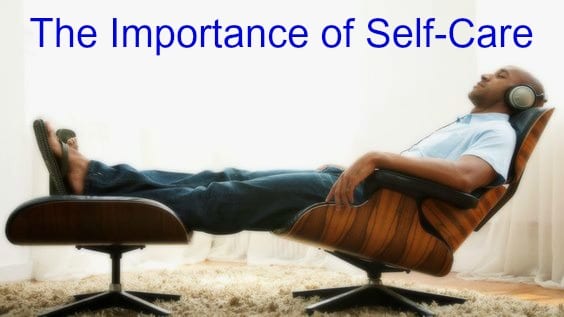 You’re overwhelmed at work. You have a ton of chores piling up at home, and your calendar is packed with overdue tasks and extracurricular activities. To make room for all of this stuff, you skip lunch, stop going to the gym, and forget about your social life entirely. Many of us grew up believing that the more you sacrifice, the bigger the reward. You may know this all too well from all night cram sessions in college or taking the brunt of the work on a project at the office. You think that pushing yourself to the point of exhaustion has to pay off eventually.
You’re overwhelmed at work. You have a ton of chores piling up at home, and your calendar is packed with overdue tasks and extracurricular activities. To make room for all of this stuff, you skip lunch, stop going to the gym, and forget about your social life entirely. Many of us grew up believing that the more you sacrifice, the bigger the reward. You may know this all too well from all night cram sessions in college or taking the brunt of the work on a project at the office. You think that pushing yourself to the point of exhaustion has to pay off eventually.
Of course, the next day, you are so exhausted you can barely function and don’t do well on the test or work meeting. It is easy to take the “hard work pays off” adage too far, to the point that it becomes counterproductive. Your abilities are worn. Your skills aren’t as sharp. You lose focus. You might think you’re working hard, but you’re not working efficiently. When we’re stressed, self-care is usually the first thing to go. And that only makes things worse.
Some people may think self-care is selfish. Actually, self-care makes you more effective and energetic. When you avoid things that make you feel physically and mentally well, you deplete your confidence, energy, and self-esteem. Self-care is important for your family and friends too. They learn from you, so setting functional boundaries to take care of yourself shows them that they too need to put themselves first and not overextend themselves. Unhealthy relationships come about when you don’t take time for your needs.
Self-care Is Crucial
It is easy for many of us to neglect taking care of ourselves because when we’re busy and overwhelmed, even a small reprieve feels like a luxury. So actually taking time to eat lunch, exercise, and hang out with friends feels like slacking. That mindset backfires, though. Self-care actually helps you make progress faster for a few reasons:
- Self-care prevents “overload burnout”: Self-care helps you avoid getting to the point of pushing yourself so far that you give up.
- Self-care reduces the negative effects of stress: A small amount of stress can serve a purpose, but too much stress breaks down your mind and body. Taking care of yourself means keeping your stress from taking over so you can function at full capacity.
- Self-care helps you refocus: Breaks are the epitome of self-care, and studies show they’re great for helping you perform better. Sometimes we need to take a walk away from the stress and come back to it after we are focused.
What is Self-care?
Self-care is not a reward. Self-care is care provided “for you, by you.” It’s about identifying your own needs and taking steps to meet them. Self-care is about taking proper care of yourself and treating yourself as kindly as you treat others.
Everyone knows that if you are on an airplane and an oxygen mask drops in front of you, you are supposed to put on your own oxygen mask before you assist anyone else. Only when we first help ourselves can we effectively help others. Caring for yourself is one of the most important things you can do for yourself. It is also one of the easiest things to forget. But you benefit greatly from self-care and so do others in your life.
Make Time for You
Make time to exercise. It’s easy to neglect exercise when you’re overextended because exercise requires time, energy, and often a change of clothes or trip to the shower. It’s daunting, messy, and uncomfortable. Consider teaming up with a workout buddy to hold yourself accountable. If you’re busy, try an exercise app. Many apps suggest specific exercises and routines based on how much time you have, even if it’s only five minutes. Or, find a gym that’s close to work or home. Of course, no matter how busy or unmotivated you are, sometimes you just have to get up and do it.
Make time to eat well. Everyone wants to eat well and find food that’s good for them, but it’s hard to cook or plan meals when you’re busy. When you have three deadlines due or three kids’ activities after work, you are much more likely to reach for leftover pizza rather than make a salad. However, start small and focus on one area at a time rather than trying to overhaul your entire diet at once.
Often, eating junk feels like self-care. You may “treat” yourself with a handful of Oreos. Nothing wrong with the occasional indulgence, but in contrast, you may think of healthy food as the enemy. This really involves changing the way you think about eating well entirely, but you can start by experimenting with healthy foods you might actually like, and not trying to force yourself to eat stuff you hate just because it’s healthy.
Practice emotional hygiene. Though taking care of yourself physically is important, when many people talk about self-care, they’re talking about emotional health: dealing with stress, anxiety, sadness, or depression. And that’s probably because we tend to ignore it more than physical self-care. When you’re feeling any kind of intense emotion—stress or anger, for instance—it helps to take a quick break to process it. What exactly are you feeling, and why? It might help to run down a list of feeling words to help better pinpoint your emotion.
Keeping a journal is a good idea, too. It can be cleansing. And a study from the journal Advances in Psychiatric Treatment researchers found that journaling for 15–20 minutes helped study participants cope with traumatic, stressful, or emotional events. Even though it may sound a bit touchy-feely, that is the point of emotional hygiene. You want to take time to deal with your feelings so you can control them and get back to work. Controlling your emotions means acknowledging and understanding them. If your emotional pain is especially difficult to manage, you might consider talking with a good therapist.
Protect your schedule. Protecting your schedule often means learning to say no to things, which can be tough for some people. This is even harder in a work setting. Try these three ways to say no at work.
- “I’m swamped right now, but feel free to follow up.”
- “I’m not qualified to do what you’re asking, but here’s someone else.”
- “This isn’t in my wheelhouse, but I know someone who might be helpful.”
Of course, sometimes you just have a boss or manager that asks for too much. In that case, you may need to schedule time to discuss your workload and your responsibilities. It’s easier said than done, and not all bosses will understand the need for self-care, unfortunately. However, it’s a better option than simply continuing to say yes.
If you are the one squeezing too much into your schedule, though, try to combat this by adding empty events in your schedule. This way, if a task takes longer than expected or something else comes up, you’ve budgeted the extra time for it. Also, block time in your calendar for yourself. Create some down time in your schedule to devote to activities you enjoy: reading, catching up on game highlights, or going to a museum or show. Then, do everything you can to defend that time.
Spend your time (and money) on what matters. Focus on the one big thing each day that will make you feel accomplished. This way, you’re aware of what really matters to you, which makes it easier to prioritize your time accordingly. And your money is a lot like your time; ultimately, you want to spend it on what matters to you. When we’re stressed, it’s common to spend mindlessly. That usually makes things worse, because money is a huge source of stress for a lot of us.
Learning to manage your time and money is another way to embrace self-care, and you can start by creating a budget with a purpose. Even if the purpose is getting out of debt, it helps to declare why getting out of debt is important to you. Make the goal about you, and not only will you feel better about budgeting, you’ll also be more apt to stick to it, and therefore less stressed.
What are Some Examples of Self-care Activities?
Remember, practicing self-care does not have to cost much. In fact there are many things that you can do that are free or affordable. Make a date with yourself. Spend an hour alone doing something that nourishes you.
- Read books you enjoy.
- Watch a movie.
- Paint or write something that lets out your creative energy.
- Learn something new, research something you’re interested in.
- Take a class for fun.
- Take a quick nap. Only 10 to 20 minutes can reduce your sleep debt and leave you ready for action.
- Eat something you enjoy.
- Enjoy a long bath or shower.
- Stretch or do Yoga.
- Run or walk for a few minutes to get your heart rate up.
- Touch a pet. If you don’t have one, go to the park or animal shelter and ask to touch one.
- Give your body comfort. Pick something from your wardrobe that feels great next to your skin.
- Use lotion or a product that makes you happy.
- Spend time with real friends and other people who lift you up.
- Talk openly with a trusted friend.
- Sit outside with a warm coffee and listen to the birds.
- Practice breathing exercises.
- Make sure you are eating a well-balanced diet.
- Listen to music you enjoy.
- Plant a garden.
Taking care of your basic physical and emotional needs should really be the backbone for getting stuff done, but ironically, self-care is usually the first thing to go. If it’s gotten to the point that you’ve forgotten what it means to take care of yourself, the points above should help you recover.
